Managing Social Media
As with most parts of life – whether as a teenager or adult – the challenge is to “be the author” vs. “letting life happen to you.” So, this section is devoted to the basics of managing your experience of social media.
Social media is powerful and will have a significant impact on your life. Some of that impact will be positive and some will be negative. Your challenge is to determine the balance – create as many positive benefits as possible and wisely guard against the negatives.
Three Strategies for “Being the Author: of Your Experience
Strategy #1 is to manage your use of social media – getting the benefits while avoiding the pitfalls. This includes knowing that social media sites are engineered to make you dependent on them – and they are very good at it. Because they have so many resources to take away your independent choice you are the underdog, so you need to take this seriously and really manage your use to protect yourself.
Strategy #2 is to co-manage with your parents. You might want to run away from this one, but don’t. Your parents will be afraid for you – for good reasons. You can help them and help yourself by letting them know that you understand the benefits and the risks and that you will be managing your use with that in mind – and that they can help co-manage by… (fill in the blank). If they know you “get it” they can relax a bit. If they know you are committed to managing your use (vs. just being a victim), they can relax a bit more, particularly if you can lay out how you intend to manage your use. You are helping the “parent from love vs. fear” and that’s a big deal with social media.
Strategy #3 is to work to make sure that “your sense of self is stronger than the screen.” That just means focusing on your three core challenges as a teenager – developing your evolving identity, building the competencies of a young adult, and developing more mature relationships with your peers and parents and romantic interests.
What’s Here to Help You Manage Social Media?
- Key Things to Keep in Mind
- Potential Positive Effects
- Potential Negative Effects
- Strategies for Teenagers
- Strategies for Parents
- A Strategy for Teenagers and Parents
- Data – What the Numbers Say
There are a surprising number of books, articles, and sites dedicated to social media issues. But there is no single “how to” source for dealing with social media, so it’s important to explore what you can find and pay attention to the sources that make the most sense to you.
Note. As with all sections of this site, this section is built around information and guidelines, not specific “how to” advice or counseling. There is no formula for managing your social media experience. Everyone has to find their own way, but there are some common concepts to consider as you do that.
#1 Key Things to Keep in Mind
This is complex – focus and be aware
- Don’t let it manage you. Social media is now a major part of life, and it is powerful. It will manage you, if you don’t manage it
- Be the author. The challenge is to “be the author” – make it work for you – get the benefits and guard against the pitfalls.
- Common challenges. In the world of social media you will confront the same core challenges and journey experiences as in the physical world. It’s just a different world in which to explore creating your identity as a young adult; developing new or different relationships; and building a range of competencies for success as a young adult. These common challenges are a good basis for conversation with peers and trusted adults because they are common ground and they are important.
- Vulnerability. The better you do on those three core challenges, the less vulnerable you will be to the negative social media influences. Note: If you are not doing well in terms of social-emotional well-being, you will be more vulnerable to the negative effects – but may find the positive effects to be a great help if managed well.
- They manipulate you. The various platforms – Instagram, TikTok, etc. – vary in terms of design as well as the potential positive and negative effects, so they need to be managed differently. Just remember that they are all designed to manipulate you to meet their business objectives. That’s part of why you have to manage them – to avoid being managed.
- Parents. Strange as it may sound, parents can actually be very helpful in supporting your management of your experience – particularly in guarding against the dangers.
- This is a big deal. There are some great benefits to be gained and there are some serious dangers. The problem is that the sites have tremendous resources devoted to making you dependent on them and they are poor at managing the dangers that they present to you. That’s why your ability to manage (c0-manage with your parents and other trusted adults) is such a big deal. The game is stacked against you by design, so you have to be really good at managing your experience.
#2 Potential Positive Effects
There are significant benefits – Go after them
If you can manage your life on social media, there is a surprising number of good things that you can make happen. Managing your social media experience is a good way to enhance your ability to manage your life in general.
- Social connections – stay connected with friends, develop new connections, develop social skills, feel less isolated or left out, and give and receive emotional support
- Community engagement – volunteer, learn about community life and issues, connect with others, raise money for causes you care about, etc.
- Have fun – find entertainment and humor alone or with others
- Individual and collective creativity – create blogs, podcasts, DIY projects, videos, school projects, etc.
- Expand your world – learn about events and issues outside your immediate environment
- Deal with individual and cultural differences – while engaging with others learn respect, tolerance, the value of diversity, how to have tough conversations and resolve conflicts, problem solve, etc.
- Develop your identity – explore, test, expand your perspectives, get feedback, see what fits, etc.
#3 Possible Negative Effects
The potential negative effects are presented here, not to scare you, but to highlight where the dangers lie, so that you can better manage them.
There are some real and serious dangers that naturally come with the world of social media. They need to be managed and that is sometimes not easy to do, particularly in areas where you will need to put some limits on the time you spend online or some of the sites you visit.
- Disconnection. You can become disconnected from the “real world.” This is usually a matter of spending too much time in your digital world and not enough time in your physical world. It’s a matter of balance and that can be tough to maintain with a digital world that is designed to draw you in.
- Interference with healthy stuff. Social media can significantly interfere with key aspects of your life – things that really do matter, such as sleep, homework, exercise, family relationships, involvement with organizations and groups, other activities, etc.
- Reputation. Your reputation can be damaged. Others can maliciously damage your reputation and you can hurt it by posting inappropriately.
- Inappropriate content. You can be exposed to too much inappropriate content (too much violence, sex, drugs, bad information on key topics, etc.).
- Unrealistic comparisons. It is easy to compare yourself against unrealistic profiles, which can be depressing and generate envy and jealousy.
- Diminished. You can be bullied, excluded or otherwise diminished through no fault of your own.
- Replaceable. You can feel replaceable if you don’t respond fast enough to the posts of others.
- Too much shared. There is often pressure to share too much information.
- FOMO – fear of missing out – is a frequent experience.
- Victimized. You can be victimized by scams, sexting, catfishing, deceptive advertising, etc.

Yes, there really are a lot of natural dangers with social media. So, you need to be good at managing your use of social media to minimize the impact those dangers might have. The dangers are naturally there. Manage them as much as possible – and get support. That’s being the author of your experience.
#4 Strategies for Teenagers
Be the author – Get the benefits & guard Against the dangers
Manage your social media use, so that your parents don’t have to. Educate your parents about your social media use, particularly how you are getting the positive benefits, but also how you are guarding against the dangers. You can also let them know how they can help you (things to do and things to not do). “Co-managing” is the most effective approach, but it takes work and building trust.
Focus on the positive possibilities. You have a lot of control there and the more power you exercise in getting the benefits from social media, the less power the negative stuff has.
You can simply identify the top 3-5 areas of positive possibilities that you want to focus on – see #2 above. Choose specific actions to take in each of those areas. You don’t need to act in every area. Just follow your interests and take advantage of any available resources (people, sites, platforms, etc.).
Guard against the natural dangers. Even when focusing on the potential benefits, you need to guard against the natural dangers – see #3 above. They are real and they can hurt you. Remember that your parents will probably be more focused on the possible dangers because they will want to protect you. If you are dealing with the dangers, you can partner with them to meet your needs and their needs. If you are ignoring the dangers your parents will have to step in – and should.
Note. As with many of the challenges you will encounter on your journey, some of your efforts will be successful and some will be disappointing. That’s just the way it works. If something doesn’t work let it go and learn from the experience. That’s how you develop the perseverance and resilience required for success on the journey (any journey in life).

Manage the Negative Impacts
The dangers are designed in – be aggressive in defending against them
In General: Get ahead of the game, so that others don’t have to play too big of a role. If you are clearly taking care of yourself, then others don’t need to be overly involved.
Take the initiative to negotiate a good agreement with your parents about how you will use social media and their role. This can be extremely valuable in developing a good teen/parent relationship (changing from the child/parent relationship of the first 12 years). It can also help you manage your social media experience.
Focus on managing your social media experience so that it doesn’t interfere with the key parts of life (this can be tough): sleep; diet; family relationships; exercise; schoolwork; involvement in teams, groups and organizations; other activities, etc.
Be Smart When Posting
This is critical because of the ease with which online communication can be misinterpreted and because of its “forever” nature. Fortunately, there are some easy strategies that can keep you out of most posting trouble.
- Pay attention to the “3 Ws.” Who is your audience? What is the message? Why are you sending it?
- Be nice. Social media is a poor place to attack someone. You can certainly defend yourself, but do it wisely – don’t just react.
- Think twice. Before hitting “send” think twice or set a wait time. That just keeps you from reacting in a way that you would regret later.
- Ask WWGS. What would Grandma say? What would a college admissions officer, potential employer, or someone whose respect you want say about your post?
- Protect your personal information. This sounds simple, but it’s easy to “share” and find out you left yourself vulnerable to people who mean you harm.
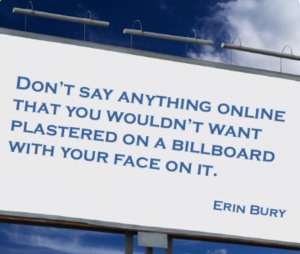
Protect Against Things that Can Diminish You
One of the biggest problems with social media is how easy it is to be diminished in various ways – feeling smaller or “less than” – from competence and attractiveness to desirability as a friend or romantic partner. And it’s easy to feel small and disconnected in a big world.
It’s important to not let social media diminish you, so be alert to not letting the following pitfalls get to you – take their power away.
- Comparisons. It’s natural to compare yourself to others, but remember that most people post overly positive images of their lives – and you may be more focused on what’s missing in yours.
- FOMO/being excluded. Fear of missing out is a big danger and can be magnified online. If you are pursuing the positive aspects of social media and making things happen in your life, this danger has much less power.
- Bullying. There is something wrong with bullies so keep that in mind. Online bullying is easier and the bullies don’t even have to confront you in person or see the hurt they cause. Pretty cowardly. If you’re being bullied online, get help and disconnect from the method they are using.
- Damage to your reputation. Your responsibility is to make sure that you don’t damage your reputation by posting inappropriately. Others can also damage your reputation and that can be hard to deal with. Getting help from others – peers or trusted adults may be necessary.
- Scams. There are a lot of scams out there and more all the time. There is no magic way to avoid them. You just have to be alert and use common sense. If it seems too good to be true, it probably is. If you have any doubts, don’t click.
- Overly influenced by advertising. Like social media in general, advertising – by its nature – is designed to manipulate you. It’s designed to get you to do something, usually spending money, but maybe taking some action. Not all advertising is bad, but just remember that advertisers aren’t your friends and don’t have your best interests at heart. They want you to do something for them.
- Inappropriate content. Inappropriate content is that content that distorts reality. That can be violence, pornography, diminishing individuals or groups, false information in general, etc. If it distorts reality, it’s a lie and there are a lot of lies that can lead you down bad paths – from beliefs to actions. Just be alert and smart – and don’t get sucked too far into any aspect of social media that seems to be a distortion – it seems to be “off” in some way.
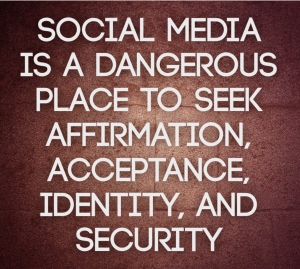
Note: Effectively managing your social media experience works best if you have connections with others to support you. Protecting yourself can be hard because social media can be slick and confusing and addictive. The best approach is to talk with others – peers or trusted adults. This is true both for pursuing the potential benefits as well as guarding against the dangers.
That can provide a lot of perspective, help help making good decisions in a confusing world and confidence. Heroes never went on their journeys alone in the myths and movies (it doesn’t work out well if you go alone) – and you shouldn’t either on your teen journey. This is particularly true in dealing with social media. This is actually a good topic for conversations and can help develop relationships in general. Being a teenager is really a team sport.
#5 Strategies for Parents
Model & guide – flexibly
Every parent/teen relationship is different and those relationships naturally change over time, so take these strategies as guidelines, not a recipe. And remember that the central challenge for your teenager is to manage their experience (“be the author”) with social media, not comply with rules – although that can be part of the experience.
Also remember that the dance required to go from parent/child to parent/teen and then parent/young adult is always an awkward dance and dealing with social media can be a very awkward part. As a parent you will probably be more focused on protecting your teenager from the dangers – and your teenager will probably be more focused on getting the potential benefits. That’s not good or bad – just the way it works.
Note. If your teenager is in crisis, a more prescriptive hands-on approach is needed.
The Heart of the Awkward Dance
The central challenge of this awkward dance is (a) teenagers learning to take on responsibility and make good decisions and (b) you letting go of control. That is often tough and scary because teenagers need room to take on responsibility and have to push themselves to do that – and parents need to take risks to give them that room. That is tough and scary because it doesn’t magically happen and it’s not without risks. But social media is a specific area where that shift can happen.
Parent Strategies – Start with Yourself
- “Model the Way.” Be a role model for managing social media – taking advantage of the potential benefits and guarding against the dangers. Your teenager may or may note hear what you say, but they will not miss what you do.
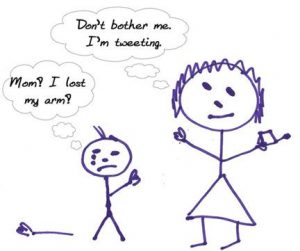
- Keep learning. This is a critical topic, so don’t fall prey to misinformation, simple solutions, too little information, etc. And lear from your teenager. This is some of the modeling. A learning posture also increases confidence as you are seeking new insights and solutions vs. worrying about the dangers (you will still worry, but not as much).
- Make social media a normal topic of conversation. Talk about social media – how you use it, what you’re learning, how they use it, what they’re learning, acknowledging and dealing with the dangers and strategizing for gaining the benefits. This is genuine curiosity and exploration, not debates, lecturing or prying.
- Focus on how to get the positive outcomes. You will have to overcome the natural tendency of parents to focus on avoiding the dangers (keeping your teenager safe), but a lot of common round is possible in pursuing the benefits. This doesn’t mean to ignore the dangers.
- Stay flexible. Your teenagers experience and ability to manage their social media experience will evolve – as will your experience and knowledge. Keep recalibrating the relationship, so you aren’t trying to relate to someone who has moved on.
- Connect with others. This is a tough challenge, so the more connections you have with people and resources to support you, the better,
- Work with your teenager to maintain a balance of pursuing benefits and guarding against dangers. If you are challenging yourself to focus more on pursuing the benefits you can challenge your teenager to take more responsibility to focus more on avoiding the dangers. This helps your teenager take more responsibility (being the author) and takes some of the “bad guy” pressure off of you.
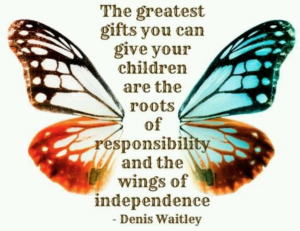
#6 A Strategy for Teens and Parents
Create a Social Media Agreement
This strategy combines what teenagers can do and what parents can do to pursue the benefits of social media and guard against the dangers. It focuses on the teen/parent relationship, which is a critical focus because that relationship is changing. It is changing from the child/parent relationship to the teen/parent relationship on the way to a young adult/parent relationship. Social media is important enough and tough enough to provide a collaborative challenge that can accelerate the development of a healthy teen/parent or young adult/parent relationship.
Developing a social media agreement in a collaborative fashion isn’t necessarily easy (although it might be). It is an excellent way to (a) identify strategies for gaining the benefits and guarding against the dangers and (b) develop a more mature teen/parent relationship by taking on a tough challenge.
The key to success is to approach the creation of the agreement with the understanding that the agreement is important, but that the process of creating it may be much more important – and it can change with experience.
There is no “one-size-fits-all” agreement to simply impose, but there are some guidelines or principles to guide the process.
- The key term is “agreement.” This is not a structure or model to be imposed. It is an agreement to be reached in a way that develops the teen/parent relationship. This can take a while, but the process can be invaluable.
- Individualize the agreement. There is no recipe or formula. Everyone has to find their way and agreement can vary widely from family to family.
- The key approach is “interest-based negotiation.” The key question is not, “What should the agreement look like?”, but rather “What interests should the agreement lead to?” To oversimplify, what potential benefits does the teenager in the family want to get from social media use? What dangers do the parents want to avoid? What agreements in terms of behaviors will meet as many of those interests as possible?
For example, the key parental interests are usually focused on keeping their teenager safe and healthy (from getting enough sleep and succeeding in school to staying connected to the family and avoiding being abused online). Key teen interests usually range from staying connected with friends and what’s going on to making new connections and being entertained or dealing with stress.
Any agreement needs to meet as many of these interests as possible and that can take some experimenting. Both teens and parents will be challenged to genuinely engage, to identify their interests, to listen to each other, and come up with agreed upon behaviors targets. And yes, that will include some boundaries or limits.
4. Make it a “living document.” Be open to changing the agreement based on experience. Set some review points, for instance two weeks, 30, 60, or 90 days, etc. This is particularly important if it is a particularly limiting agreement to deal with a crisis or out of control situation. Reviews are best if they are relatively frequent and informal. They basically answer the questions, “How are we doing? What do we have to celebrate, particularly little things? What have we learned? What do we want to keep doing, start doing, or stop doing?
5. If it doesn’t work, try again. Sometimes an agreement can’t be reached. Try again. Like reviews for an agreement, a second try could be in 2 weeks, 30, 60, or 90 days, etc. This is a tough challenge and remember that the teen/parent dance is an awkward one and failing and trying again may just be part of the dance. Plus, it’s a chance to practice and model persevering and being resilient in the face of a tough challenge.
If an agreement can’t be reached, then limits will probably have to be imposed to deal with the dangers – and then be battled over. That’s not a happy experience and it can have significant consequences, from stressing and undermining the teen/parent relationship to self-destructive behaviors. Trying again is worth the effort. Getting help may be necessary.
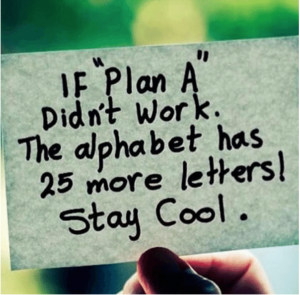
#7 Data – What the Numbers Say
There is lots of data out there about teen social media use. The following sets of data are examples and representative of what’s out there. The data is useful as it provides a general picture of the social media experience.
From the Pew Foundation 2018
- 95% of teenagers have access to cell phones
- 45% are online “almost constantly” and 44& are online several times a day
From Common Sense Media
- 75% of teenagers have social media profiles
- 51% visit networking sites daily – 33% multiple times
- 25% use more than one site per day
- 13-18 year-olds spend an average of 7 hours and 22 minutes on screens per day
Positive or Negative Experience
31% of teens had a mostly positive experience
- Connecting with family and friends (40%)
- Easier to find news/info (16%)
- Meeting others with same interests (15%)
- Keep entertained/upbeat (9%)
- Self-expression (5%)
- Getting support from others (4%)
- Learning new things (3%)
24% of teens had a mostly negative experience
- Bullying and rumor spreading (27%)
- Harms relationship – lack of in-person contact (17%)
- Unrealistic view of others’ lives (15%)
- Distractions/addicted (14%)
- Peer pressure (12%)
- Mental health issues (4%)
- Drama in general (3%)
- Other (12%)
45% of teens reported neither a positive or negative experience
Misc Numbers From Multiple Sources
- 57% said social media interferes with homework
- 54% said social media distracts them from friends when they are with them
- 68% agree that social media has a negative impact on their friends (20% strongly agree)
- 75% say that the person they present on social media is an accurate portrayal of themselves – but not always complete
- 40% say that social media is extremely or very important for keeping up with friends
- 33% say that social media is important for meaningful conversations
- 46% say they are addicted to their phones – 24% to social media
- 64% see hate speech on social media at least sometimes and over 20% say often
- 81% say social media does not affect their mental health
For Teens with Low “Social Emotional Well-Being” (low SEWB = 17% of teens)
There is no difference in frequency of use, but there is a heightened degree of importance – both positive and negative for teens with low SEWB
- My social life would be ruined if I didn’t have social media (37% vs. 19%)
- Feel bad when no likes (43% vs. 13%)
- Left out when not in pictures of gatherings (70% vs. 29%)
- Accurate presentation of self online (65% vs. 80%)
- Have been cyber-bullied (35% vs. 10%)
- Unplugging is no problem (52% vs. 82%)